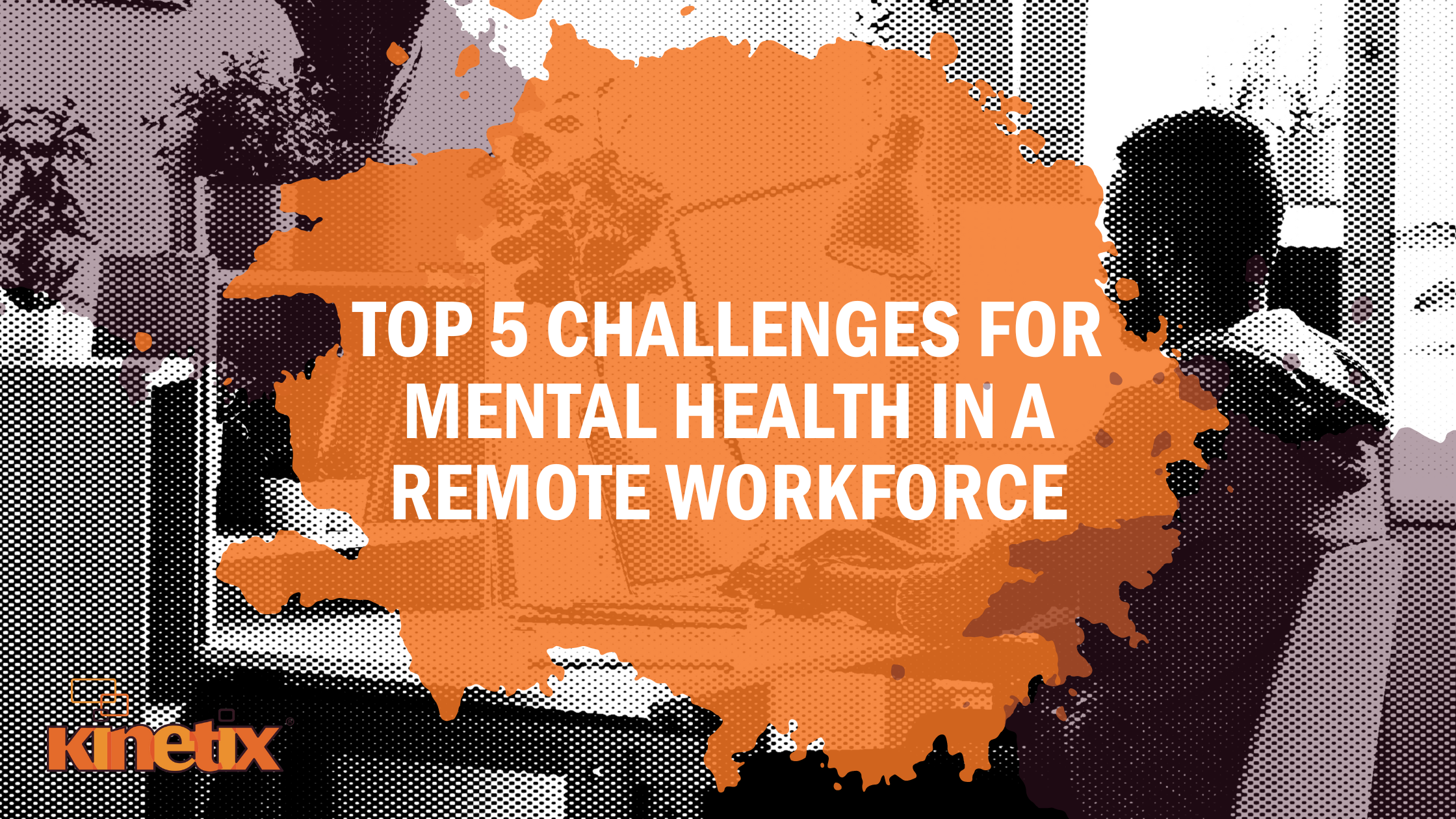
Discussions around mental health have been a taboo subject until relatively recently. And discussions about mental health in the workplace can still be considered taboo. It can be challenging to shake off the adage of "don't bring your problems to work", which is why 60% of employees keep quiet about their psychological wellbeing. With many employees experiencing stress and anxiety due to the COVID-19 pandemic, mental health support is more important than ever.
As the boundaries between work and home continue to blur with increasing numbers of employees continuing to work from home, how companies respond to mental health problems is of greater importance than ever. A study conducted by the APA in 2021 found that most employees working from home say they have experienced negative mental health impacts.
If knowing is half the battle, then being aware of the following challenges in a remote workforce, will go a long way in providing your employees the support they need as they confront mental health issues associated with working from home.
Isolation
A rise in remote work is likely to exacerbate feelings of loneliness, as workers have lost a major source of connection in their lives. Now that water cooler chats and team lunches are gone, employees feel increasingly isolated as they have lost opportunities to connect with their colleagues.
Feelings of isolation and loneliness have consequences that extend far beyond a longing for our coworkers. Feeling isolated can cause anxiety, trouble sleeping, and other health problems associated with a sedentary lifestyle. To help your employees deal with feelings of isolation, companies can encourage employees to:
- Work one day per week outside the home at a café or co-working space
- Take advantage of their flexible schedule during the day
- To make plans after work when they feel isolated
- Use video conferencing tools and phone calls to communicate with their team
- Offer remote workers a co-working space stipend
Burnout
Burnout isn't a mental health diagnosis, but it refers to a collection of symptoms that can cause mental health issues if left unaddressed. Employees experiencing burnout may feel exhausted, lack motivation, feel irritable, anxious, and less productive. These feelings are not uncommon; according to Deloitte, 77% of workers feel burnout at their current job.
The Mayo Clinic recommends the following actions to alleviate symptoms of burnout:
- Discuss your concerns with your supervisor to change expectations or reach a compromise
- Seek support from coworkers, friends, or loved ones; support and collaboration might help you cope
- Explore relaxing activities or programs that can help you manage stress, such as yoga, meditation, or tai chi
- Get some exercise. Regular physical activity can help you to better deal with stress. It can also take your mind off work
- Sleep more. Sleep restores feelings of wellbeing and helps protect your health
- Practice being mindful, focusing on your breath flow, and being intensely aware of what you're sensing and feeling at every moment, without interpretation or judgment
Maintaining Morale
Not that long ago, working remotely seemed impossible for many professionals. Today, remote work and telecommuting are surprisingly commonplace. Even for professions thought to be out of the purview of remote work, like HR. The pandemic has been a catalyst for speeding up a trend that was a long time coming. But the true impact of working in a remote environment is only beginning to show its downsides. A work-from-home environment can have a significant effect on your employee's morale.
People are built for connection, and working remotely can impact your employee's sense of team spirit and morale. However, there are things we can do as employers to boost morale even in a dispersed environment. For example:
- Stay connected with virtual meetings
- Respect employee's non-working hours
- Promote collaboration and connection
- Make recognition a priority
- Encourage learning and development
- Allow for a more flexible rhythm at work
- Ask for feedback and act on it
Loss of Structure
Simple structures and routines provide a feeling of continuity and stability, which is crucial for many people's mental wellbeing. For many, working remotely can feel like being in a state of limbo caused by losing a good deal of our typical structure. Losing your sense of structure can result in mental stress and even trigger anxiety in extreme cases.
The lack of structure when working remotely can be a huge problem for many people. These feelings can arise from the increased flexibility that remote working brings or the fact that we don't physically have to be in an office under the watchful gaze of coworkers and management. To combat feelings of a loss of structure, we need to create the structure for ourselves. Here are a few suggestions to help you make that structure:
- Set regular work hours and communicate them to those you share your space with, if you share a workspace.
- Don't start household chores or cook between meetings or during the working part of your day. You'll have to stop work and divert your attention if you do.
- Structure exists in office environments because of rules and standards. These rules and standards may not exist in a remote working environment, so we need to introduce them ourselves. For example, schedule a daily catch-up with the team every day at a set time.
- Time blocking is another way to provide structure to your day. Block out time in your day for specific tasks; For example, you can block out 9:00-9:30 every day to read and respond to emails. You can even go one step further and block these times out as busy/unavailable in your calendar and put your phone on silent. This will increase the likelihood of doing what you have time blocked.
Keeping the Culture and Transfer of Knowledge Alive
Building and maintaining company culture is challenging under any conditions. Still, it can be increasingly complex in remote work environments. Whatsmore, company culture is an essential element for retaining employees. According to a Glassdoor survey, 56% of employees find workplace culture more important than salary.
To keep the culture fires burning, employers can:
- Implement a mentoring program
- Create company-wide initiatives
- Prioritize communication
- Establish a virtual environment, so that team members still feel connected
- Maintain regular contact between managers and colleagues
- Scheduling an outdoor meeting or get together-restrictions permitting
- Schedule 1:1 video calls
Keeping your workplace culture alive and well when people can't work face-to-face is challenging. Companies need to keep the pule of employee morale, address tensions, redesign their remote culture, and help their team navigate the challenges of working remotely.
Mental Health Awareness Month gives us a valuable opportunity to celebrate the enormous strides we made in promoting mental health and increasing the public's knowledge. Mental health will impact all of us or someone we know at some point in our lives. So, this month remember to take care of yourself and your coworkers.

